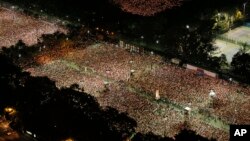Tens of thousands of people have turned out in Hong Kong for a vigil marking the 25th anniversary of the bloody crackdown on protests in Beijing's Tiananmen Square.
A sea of candles lit the massive Victoria Park late Wednesday, as throngs gathered to sign songs and listen to speeches marking the massacre that ended the 1989 pro-democracy movement in China.
Renz Tse, an activist taking part in the vigil, says it is crucial that Beijing know Hong Kong supports democratic freedoms and opposes violence.
"We understand the importance of fighting for the democracy of the China. As Hong Kong is a part of China and nowadays the political reforms are now opposed by the Communist Party - they are trying to elect a chief executive [of Hong Kong] that only responds to the mainland China government," said Renz.
The situation was much quieter in Beijing Wednesday and security was tight on Tiananmen Square. Hundreds of Chinese officers checked identifications and kept journalists from reporting in the square.
Beijing allows no public discussion of the 1989 massacre, in which soldiers killed hundreds, if not thousands, of unarmed protesters.
The White House urged China Wednesday to account for those killed, detained or missing in connection with the crackdown. It said the United States "will always speak out in support of the basic freedoms the protesters at Tiananmen Square sought."
In response, a Chinese Foreign Ministry spokesman accused the United States of infringing on China's sovereignty.
"We demand the U.S. side respect China's judicial sovereignty and not make irresponsible comments on issues that are related to China's internal affairs," he said.
China's government has never given a death toll or an official statement of what happened.
The 1989 demonstrations included citizens from all walks of life who expressed frustration at rising inequality, rampant official corruption and a lack of democratic freedoms.
Shen Tong was a third year student at Beijing University when the massacre happened. He told VOA that he did not expect Chinese troops to kill civilians in 1989.
"It is one of those things that the day before you think is impossible, [but] the day after it becomes inevitable. So in some larger sense, I would say nobody predicted that. But then when the moment actually was upon us, all the factors before that seemed to lead to that inevitable outcome," he said.
Shen Tong, who was forced to leave China for his safety following the crackdown, said the incident represents a missed opportunity for the Communist Party to be more open to the will of the people and to implement what he calls a "more balanced development."
View interactive timeline of crackdown on Tiananmen Square
A sea of candles lit the massive Victoria Park late Wednesday, as throngs gathered to sign songs and listen to speeches marking the massacre that ended the 1989 pro-democracy movement in China.
Renz Tse, an activist taking part in the vigil, says it is crucial that Beijing know Hong Kong supports democratic freedoms and opposes violence.
"We understand the importance of fighting for the democracy of the China. As Hong Kong is a part of China and nowadays the political reforms are now opposed by the Communist Party - they are trying to elect a chief executive [of Hong Kong] that only responds to the mainland China government," said Renz.
The situation was much quieter in Beijing Wednesday and security was tight on Tiananmen Square. Hundreds of Chinese officers checked identifications and kept journalists from reporting in the square.
Beijing allows no public discussion of the 1989 massacre, in which soldiers killed hundreds, if not thousands, of unarmed protesters.
The White House urged China Wednesday to account for those killed, detained or missing in connection with the crackdown. It said the United States "will always speak out in support of the basic freedoms the protesters at Tiananmen Square sought."
In response, a Chinese Foreign Ministry spokesman accused the United States of infringing on China's sovereignty.
"We demand the U.S. side respect China's judicial sovereignty and not make irresponsible comments on issues that are related to China's internal affairs," he said.
China's government has never given a death toll or an official statement of what happened.
The 1989 demonstrations included citizens from all walks of life who expressed frustration at rising inequality, rampant official corruption and a lack of democratic freedoms.
Shen Tong was a third year student at Beijing University when the massacre happened. He told VOA that he did not expect Chinese troops to kill civilians in 1989.
"It is one of those things that the day before you think is impossible, [but] the day after it becomes inevitable. So in some larger sense, I would say nobody predicted that. But then when the moment actually was upon us, all the factors before that seemed to lead to that inevitable outcome," he said.
Shen Tong, who was forced to leave China for his safety following the crackdown, said the incident represents a missed opportunity for the Communist Party to be more open to the will of the people and to implement what he calls a "more balanced development."
View interactive timeline of crackdown on Tiananmen Square






